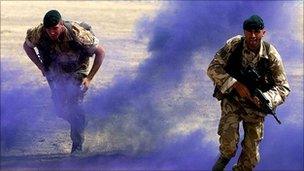Squaddie release support system is 'unfair'
- Published

British soldiers must serve at least four years before getting help returning to civilian life
A veterans charity chief says systems meant to help soldiers return to civilian life are "fundamentally unfair".
Retired Major Jim Panton told BBC's Inside Out West Midlands soldiers who have seen active tours could still find themselves without adequate support.
This is because all soldiers must serve for at least four years before they are entitled to resettlement support.
The Ministry of Defence (MoD) said they recognise more needs to be done.
'Fundamentally unfair'
Under current rules, soldiers who have served four years or more can receive grants towards retraining and a gradual return to civilian life.
But those who have not served the entire four years, known as early service leavers, are pointed in the direction of the Job Centre Plus.
Major Panton said: "You may have served three operational tours in places like Afghanistan, and Iraq before that, and only qualify for the same support as someone who's been in training for three or four weeks and decided that the army wasn't for them.
"I think that is fundamentally unfair. In the list of things that aren't quite right this is at the top," added Major Panton, who is chief executive of charity Erskine.
Some 30% of early service leavers are still out of work six months after leaving the army, compared with 20% of the equivalent civilian population.
The Ministry of Defence (MoD) has now opened a consultation into benefits for early service leavers, with a view to making changes to the current system when contracts come up for renewal in 2015.
However, the MoD has told the BBC that the review will also look at where improvements can be made straight away.
- Published16 January 2011
- Published26 October 2010